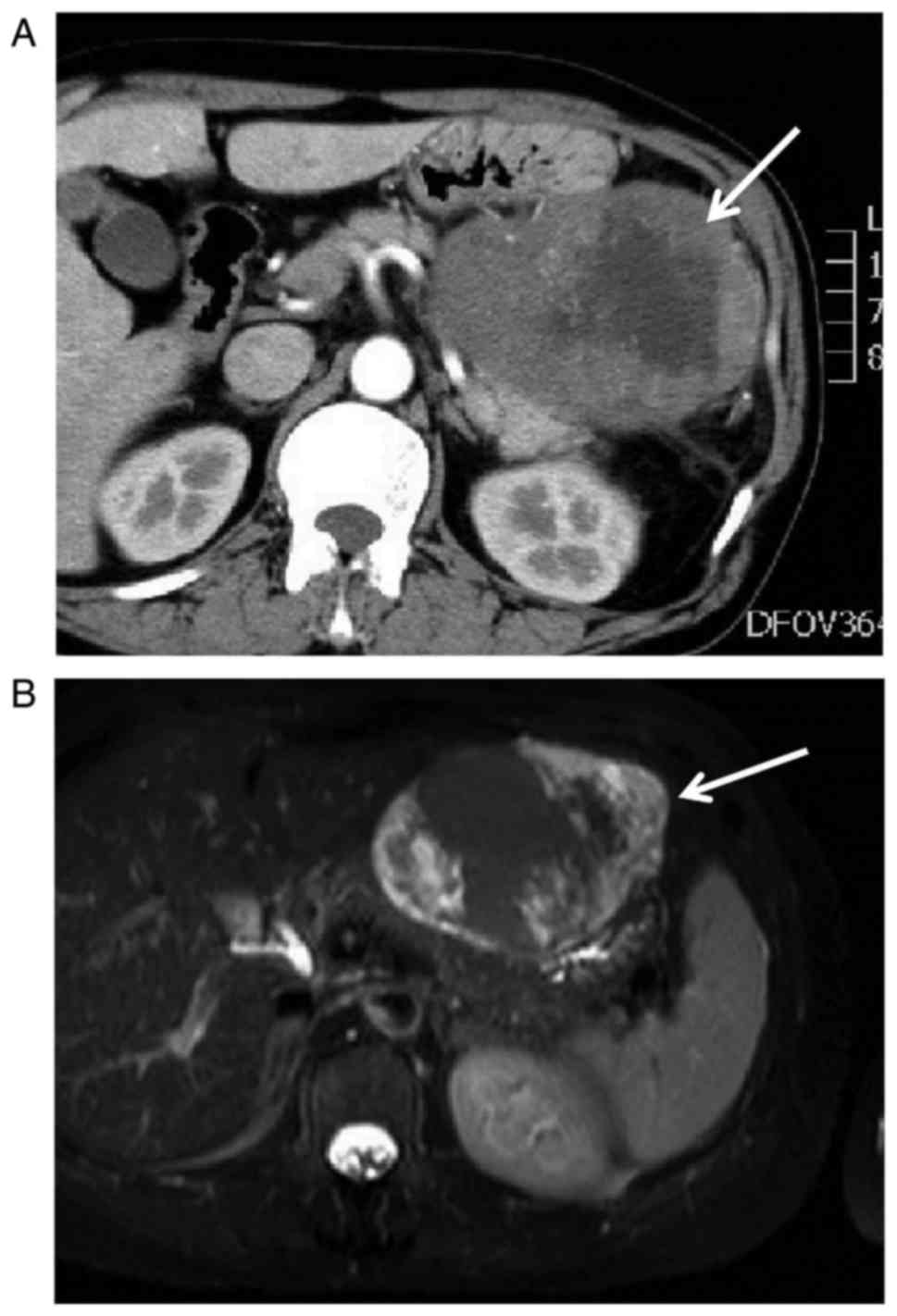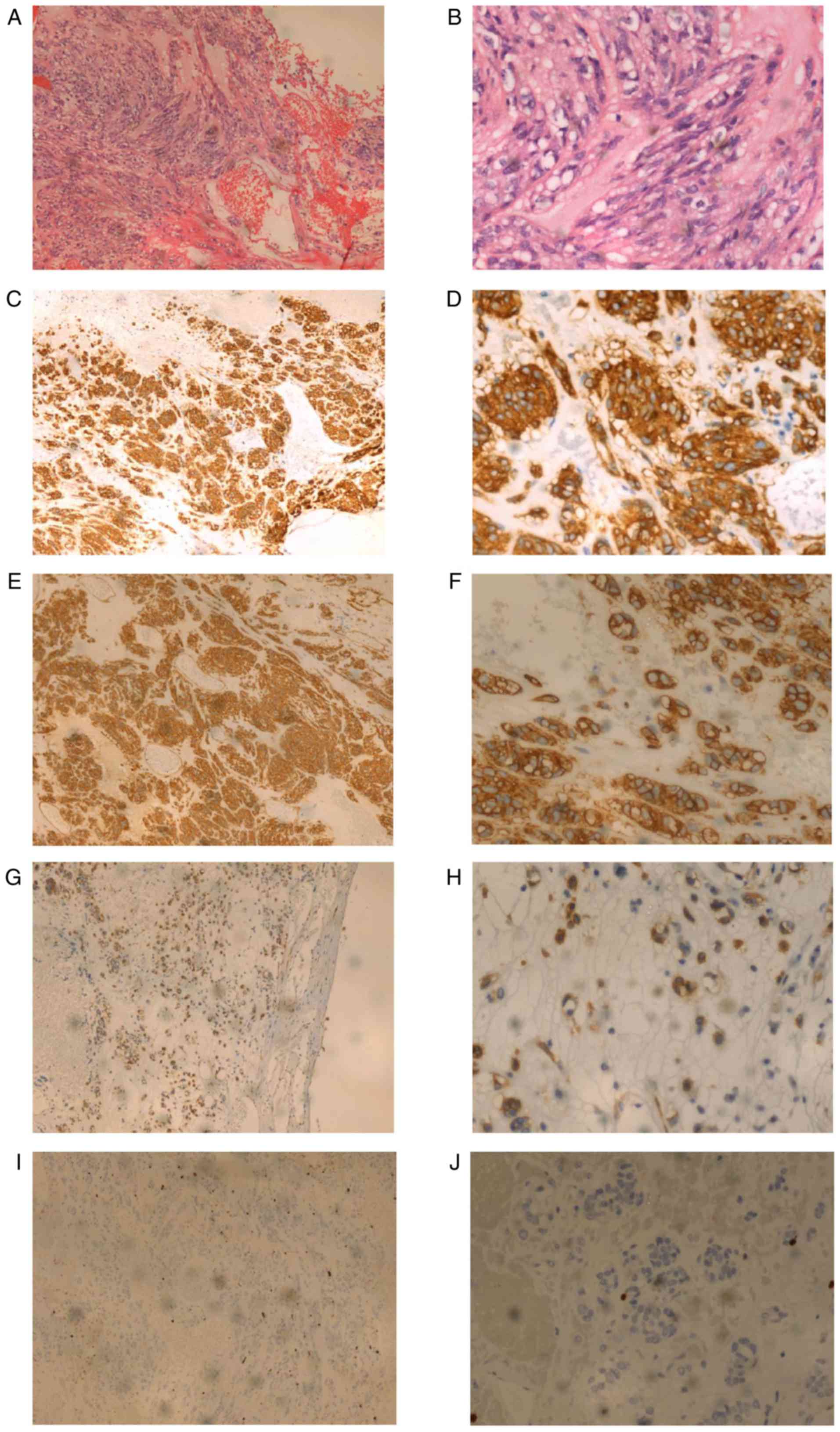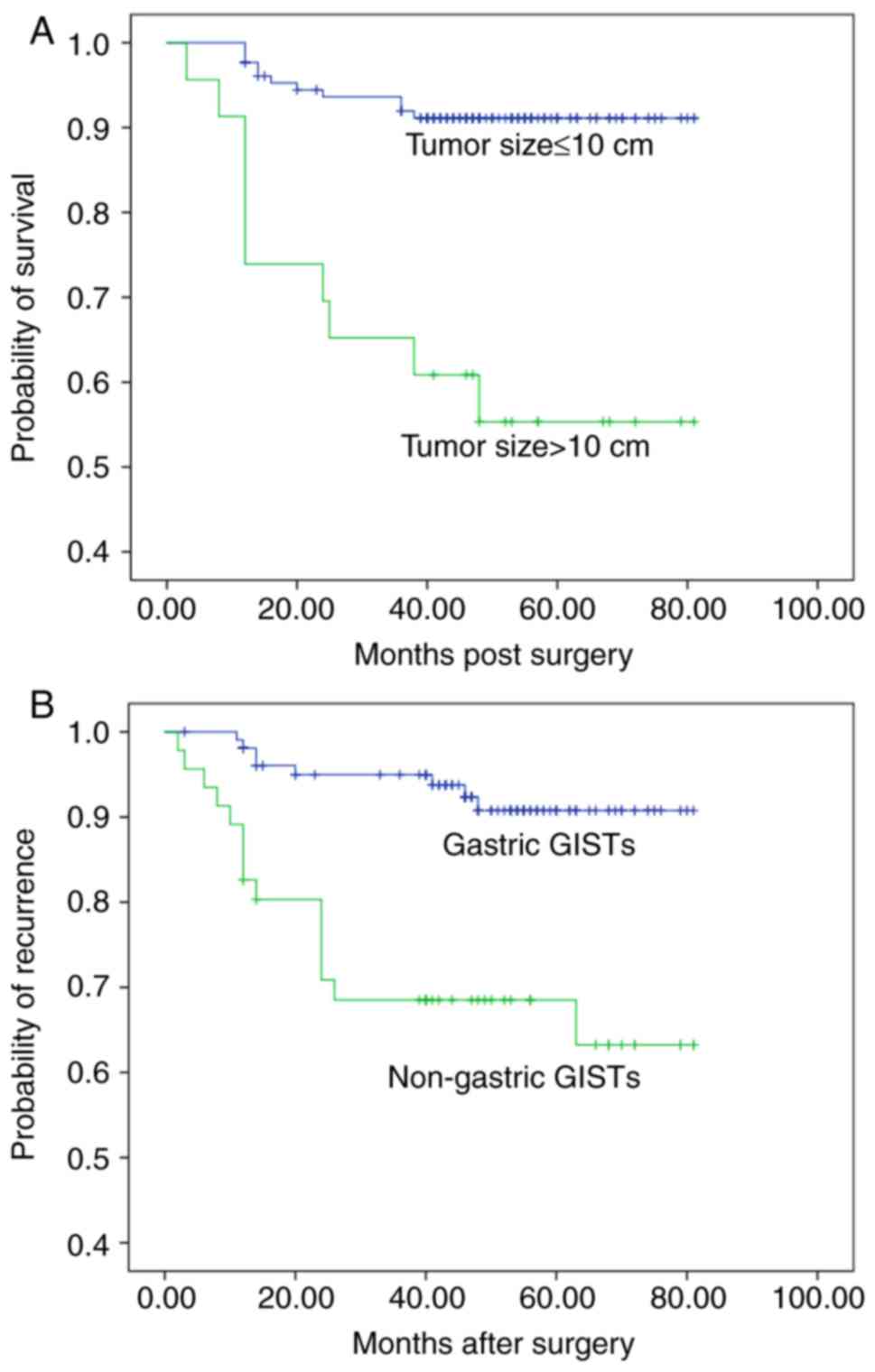|
1
|
Mazur MT and Clark HB: Gastric stromal
tumors. Reappraisal of histogenesis. Am J Surg Pathol. 7:1–519.
1983. View Article : Google Scholar
|
|
2
|
Goettsch WG, Bos SD, Breekveldt-Postma N,
Casparie M, Herings RM and Hogendoorn PC: Incidence of
gastrointestinal stromal tumours is underestimated: Results of a
nation-wide study. Eur J Cancer. 41:2868–2872. 2005. View Article : Google Scholar : PubMed/NCBI
|
|
3
|
Wang M, XU J, Zhang Y, Tu L, Qiu WQ, Wang
CJ, Shen YY, Liu Q and Cao H: Gastrointestinal stromal tumor:
15-years' experience in a single center. BMC Surg. 14:932014.
View Article : Google Scholar : PubMed/NCBI
|
|
4
|
Pisters PW, Blanke CD, von Mehren M, Picus
J, Sirulnik A, Stealey E and Trent JC; reGISTry Steering Committee,
: A USA registry of gastrointestinal stromal tumor patients:
Changes in practice over time and differences between community and
academic practices. Ann Oncol. 22:2523–2529. 2011. View Article : Google Scholar : PubMed/NCBI
|
|
5
|
Miettinen M, Monihan JM, Sarlomo-Rikala M,
Kovatich AJ, Carr NJ, Emory TS and Sobin LH: Gastrointestinal
stromal tumors/smooth muscle tumors (GISTs) primary in the omentum
and mesentery: Clinicopathologic and immunohistochemical study of
26 cases. Am J Surg Pathol. 23:1109–1118. 1999. View Article : Google Scholar : PubMed/NCBI
|
|
6
|
Miettinen M, Makhlouf H, Sobin LH and
Lasota J: Gastrointestinal stromal tumors of the jejunum and ileum:
A clinicopathologic, immunohistochemical, and molecular genetic
study of 906 cases before imatinib with long-term follow-up. Am J
Surg Pathol. 30:477–489. 2006. View Article : Google Scholar : PubMed/NCBI
|
|
7
|
Zhao X and Yue C: Gastrointestinal stromal
tumor. J Gastrointest Oncol. 3:189–208. 2012.PubMed/NCBI
|
|
8
|
Blay JY, Shen L, Kang YK, Rutkowski P, Qin
S, Nosov D, Wan D, Trent J, Srimuninnimit V, Pápai Z, et al:
Nilotinib versus imatinib as first-line therapy for patients with
unresectable or metastatic gastrointestinal stromal tumours
(ENESTg1): A randomised phase 3 trial. Lancet Oncol. 16:550–560.
2015. View Article : Google Scholar : PubMed/NCBI
|
|
9
|
Cassier PA, Ducimetiere F, Lurkin A,
Ranchère-Vince D, Scoazec JY, Bringuier PP, Decouvelaere AV, Méeus
P, Cellier D, Blay JY and Ray-Coquard I: A prospective
epidemiological study of new incident GISTs during two consecutive
years in rhone alpes region: Incidence and molecular distribution
of GIST in a european region. Br J Cancer. 103:165–170. 2010.
View Article : Google Scholar : PubMed/NCBI
|
|
10
|
Joensuu H: Risk stratification of patients
diagnosed with gastrointestinal stromal tumor. Hum Pathol.
39:1411–1419. 2008. View Article : Google Scholar : PubMed/NCBI
|
|
11
|
Goh BK, Chow PK, Yap WM, Kesavan SM, Song
IC, Paul PG, Ooi BS, Chung YF and Wong WK: Which is the optimal
risk stratification system for surgically treated localized primary
GIST? Comparison of three contemporary prognostic criteria in 171
tumors and a proposal for a modified armed forces institute of
pathology risk criteria. Ann Surg Oncol. 15:2153–2163. 2008.
View Article : Google Scholar : PubMed/NCBI
|
|
12
|
Belfiori G, Sartelli M, Cardinali L, Tranà
C, Bracci R, Gesuita R and Marmorale C: Risk stratification systems
for surgically treated localized primary gastrointestinal stromal
tumors (GIST). Review of literature and comparison of the three
prognostic criteria: MSKCC nomogramm, NIH-fletcher and
AFIP-miettinen. Ann Ital Chir. 86:219–227. 2015.PubMed/NCBI
|
|
13
|
Wang YP, Li YI and Song C:
Clinicopathological features and prognosis of small
gastrointestinal stromal tumors outside the stomach. Oncol Lett.
10:2723–2730. 2015. View Article : Google Scholar : PubMed/NCBI
|
|
14
|
Zhang P, Deng R, Liu K, Shuai XM, Bai J,
Chang WL, Gao JB, Cai KL, Wang GB and Tao KX: Clinicopathologic
features and prognosis of primary gastrointestinal stromal tumor
patients under 35 years of age: A 10-year retrospective study. J
Surg Oncol. 114:977–981. 2016. View Article : Google Scholar : PubMed/NCBI
|
|
15
|
Liu X, Qiu H, Zhang P, Feng X, Chen T, Li
Y, Tao K, Li G, Sun X and Zhou Z; China Gastrointestinal Stromal
Tumor Study Group (CN-GIST), : Ki-67 labeling index may be a
promising indicator to identify ‘very high risk’ gastrointestinal
stromal tumor: A multicenter retrospective study of 1022 patients.
Hum Pathol. 74:17–24. 2018. View Article : Google Scholar : PubMed/NCBI
|
|
16
|
Cao H, Zhang Y, Wang M, Shen DP, Sheng ZY,
Ni XZ, Wu ZY, Liu Q, Shen YY and Song YY: Prognostic analysis of
patients with gastrointestinal stromal tumors: A single unit
experience with surgical treatment of primary disease. Chin Med J
(Engl). 123:131–136. 2010.PubMed/NCBI
|
|
17
|
Mrowiec S, Jabłońska B, Liszka L, Pająk J,
Leidgens M, Szydło R, Sandecka A and Lampe P: Prognostic factors
for survival post surgery for patients with gastrointestinal
stromal tumors. Eur Surg Res. 48:3–9. 2012. View Article : Google Scholar : PubMed/NCBI
|
|
18
|
Wang X, Li WQ, Yan HZ, Li YM, He J, Liu HM
and Yu HY: Alveolar adenoma combined with multifocal cysts: Case
report and literature review. J Int Med Res. 41:895–906. 2013.
View Article : Google Scholar : PubMed/NCBI
|
|
19
|
Badic B, Gancel Ch, Thereaux J, Joumond A,
Bail JP, Meunier B and Sulpice L: Surgical and oncological long
term outcomes of gastrointestinal stromal tumors (GIST)
resection-retrospective cohort study. Int J Surg. 53:257–261. 2018.
View Article : Google Scholar : PubMed/NCBI
|
|
20
|
Tan Y, Tan L, Lu J, Huo J and Liu D:
Endoscopic resection of gastric gastrointestinal stromal tumors.
Transl Gastroenterol Hepatol. 2:1152017. View Article : Google Scholar : PubMed/NCBI
|
|
21
|
Koh YX and Goh B: Minimally invasive
surgery for gastric gastrointestinal stromal tumors. Transl
Gastroenterol Hepatol. 2:1082017. View Article : Google Scholar : PubMed/NCBI
|
|
22
|
Ford SJ and Gronchi A: Indications for
surgery in advanced/metastatic GIST. Eur J Cancer. 63:154–167.
2016. View Article : Google Scholar : PubMed/NCBI
|
|
23
|
Tran T, Davila Ja and El-serag HB: The
epidemiology of malignant gastrointestinal stromal tumors: An
analysis of 1,458 cases from 1992 to 2000. Am J Gastroenterol.
100:162–168. 2005. View Article : Google Scholar : PubMed/NCBI
|
|
24
|
Tryggvason G, Gislason HG, Magnusson MK
and Jonasson JG: Gastrointestinal stromal tumors in Iceland,
1990–2003: The icelandic GIST study, a population-based incidence
and pathologic risk stratification study. Int J Cancer.
117:289–293. 2005. View Article : Google Scholar : PubMed/NCBI
|
|
25
|
Rubio J, Marcos-Gragera R, Ortiz MR, Miró
J, Vilardell L, Gironès J, Hernandez-Yagüe X, Codina-Cazador A,
Bernadó L, Izquierdo A and Colomer R: Population-based incidence
and survival of gastrointestinal stromal tumours (GIST) in girona,
spain. Eur J Cancer. 43:144–148. 2007. View Article : Google Scholar : PubMed/NCBI
|
|
26
|
Mucciarini C, Rossi G, Bertolini F, Valli
R, Cirilli C, Rashid I, Marcheselli L, Luppi G and Federico M:
Incidence and clinicopathologic features of gastrointestinal
stromal tumors. A population-based study. BMC Cancer. 7:2302007.
View Article : Google Scholar : PubMed/NCBI
|
|
27
|
Chiang NJ, Chen LT, Tsai CR and Chang JS:
The epidemiology of gastrointestinal stromal tumors in taiwan,
1998–2008: A nation-wide cancer registry-based study. BMC Cancer.
14:1022014. View Article : Google Scholar : PubMed/NCBI
|
|
28
|
Yamamoto K, Tsujinaka T, Takahashi T, Sato
S, Nishiguchi Y, Nakashima Y, Muguruma K, Hirota S and Nishida T:
Impact of the Japanese gastric cancer screening system on treatment
outcomes in gastric gastrointestinal stromal tumor (GIST): An
analysis based on the GIST registry. Ann Surg Oncol. 22:232–239.
2015. View Article : Google Scholar : PubMed/NCBI
|
|
29
|
Sandrasegaran K, Rajesh A, Rydberg J,
Rushing DA, Akisik FM and Henley JD: Gastrointestinal stromal
tumors: Clinical, radiologic, and pathologic features. AJR Am J
Roentgenol. 184:803–811. 2005. View Article : Google Scholar : PubMed/NCBI
|
|
30
|
Scherubl H, Faiss S, Knoefel WT and
Wardelmann E: Management of early asymptomatic gastrointestinal
stromal tumors of the stomach. World J Gastrointest Endosc.
6:266–271. 2014. View Article : Google Scholar : PubMed/NCBI
|
|
31
|
Horton KM, Juluru K, Montogomery E and
Fishman EK: Computed tomography imaging of gastrointestinal stromal
tumors with pathology correlation. J Comput Assist Tomogr.
28:811–817. 2004. View Article : Google Scholar : PubMed/NCBI
|
|
32
|
Shi Z and Zhuang Q: Computed tomography
imaging characteristics of synchronous gastrointestinal stromal
tumors in patients with gastric cancer and correlation with
clinicopathological findings. Mol Clin Oncol. 3:1311–1314. 2015.
View Article : Google Scholar : PubMed/NCBI
|
|
33
|
Lamba G, Gupta R, Lee B, Ambrale S and Liu
D: Current management and prognostic features for gastrointestinal
stromal tumor (GIST). Exp Hematol Oncol. 1:142012. View Article : Google Scholar : PubMed/NCBI
|
|
34
|
Tokumoto N, Tanabe K, Misumi T, Fujikuni
N, Suzuki T and Ohdan H: The usefulness of preoperative 18FDG
positron- emission tomography and computed tomography for
predicting the malignant potential of gastrointestinal stromal
tumors. Dig Surg. 31:79–86. 2014. View Article : Google Scholar : PubMed/NCBI
|
|
35
|
Liu Q, Li Y, Dong M, Kong F and Dong Q:
Gastrointestinal bleeding is an independent risk factor for poor
prognosis in GIST patients. Biomed Res Int.
2017:71524062017.PubMed/NCBI
|
|
36
|
Yamamoto H and Oda Y: Gastrointestinal
stromal tumor: Recent advances in pathology and genetics. Pathol
Int. 65:9–18. 2015. View Article : Google Scholar : PubMed/NCBI
|
|
37
|
Miettinen M and Lasota J: Gastrointestinal
stromal tumors: Review on morphology, molecular pathology,
prognosis, and differential diagnosis. Arch Pathol Lab Med.
130:1466–1478. 2006.PubMed/NCBI
|
|
38
|
Demir L, Ekinci N, Erten C, Kucukzeybek Y,
Alacacioglu A, Somali I, Can A, Dirican A, Bayoglu V, Akyol M, et
al: Does immunohistochemistry provide additional prognostic data in
gastrointestinal stromal tumors? Asian Pac J Cancer Prev.
14:4751–4758. 2013. View Article : Google Scholar : PubMed/NCBI
|
|
39
|
Fujimoto Y, Nakanishi Y, Yoshimura K and
Shimoda T: Clinicopathologic study of primary malignant
gastrointestinal stromal tumor of the stomach, with special
reference to prognostic factors: Analysis of results in 140
surgically resected patients. Gastric Cancer. 6:39–48. 2003.
View Article : Google Scholar : PubMed/NCBI
|
|
40
|
Bertin M, Angriman I, Scarpa M, Mencarelli
R, Ranzato R, Ruffolo C, Polese L, Iacobone M and D'Amico DF:
Prognosis of gastrointestinal stromal tumors.
Hepatogastroenterology. 54:124–128. 2007.PubMed/NCBI
|
|
41
|
Dematteo RP, Heinrich MC, El-Rifai WM and
Demetri G: Clinical management of gastrointestinal stromal tumors:
Before and after STI-571. Hum Pathol. 33:466–477. 2002. View Article : Google Scholar : PubMed/NCBI
|
|
42
|
Novitsky YW, Kercher KW, Sing RF and
Heniford BT: Long-term outcomes of laparoscopic resection of
gastric gastrointestinal stromal tumors. Ann Surg. 243:738–745,
745–747. 2006. View Article : Google Scholar : PubMed/NCBI
|
|
43
|
Lin J, Huang C, Zheng C, Li P, Xie J, Wang
J and Lu J: Laparoscopic versus open gastric resection for larger
than 5 cm primary gastric gastrointestinal stromal tumors (GIST): A
size-matched comparison. Surg Endosc. 28:2577–2583. 2014.
View Article : Google Scholar : PubMed/NCBI
|
|
44
|
Liao GQ, Chen T, Qi XL, Hu YF, Liu H, Yu J
and Li GX: Laparoscopic management of gastric gastrointestinal
stromal tumors: A retrospective 10-year single-center experience.
World J Gastroenterol. 23:3522–3529. 2017. View Article : Google Scholar : PubMed/NCBI
|
|
45
|
Blay JY, Le Cesne A, Ray-Coquard I, Bui B,
Duffaud F, Delbaldo C, Adenis A, Viens P, Rios M, Bompas E, et al:
Prospective multicentric randomized phase III study of imatinib in
patients with advanced gastrointestinal stromal tumors comparing
interruption versus continuation of treatment beyond 1 year: The
french sarcoma group. J Clin Oncol. 25:1107–1113. 2007. View Article : Google Scholar : PubMed/NCBI
|
|
46
|
Papalambros A, Petrou A, Brennan N, Bramis
K, Felekouras E and Papalambros E: GIST suture-line recurrence at a
gastrojejunal anastomosis 8 years after gastrectomy: Can GIST ever
be described as truly benign? A case report. World J Surg Oncol.
8:902010. View Article : Google Scholar : PubMed/NCBI
|
|
47
|
Demetri GD, Benjamin RS, Blanke CD, Blay
JY, Casali P, Choi H, Corless CL, Debiec-Rychter M, DeMatteo RP,
Ettinger DS, et al: NCCN task force report: Management of patients
with gastrointestinal stromal tumor (GIST)-update of the NCCN
clinical practice guidelines. J Natl Compr Canc Netw. 2 Suppl
5:S1–S29, S30. 2007.
|
|
48
|
Tashiro T, Hasegawa T, Omatsu M, Sekine S,
Shimoda T and Katai H: Gastrointestinal stromal tumour of the
stomach showing lymph node metastases. Histopathology. 47:438–439.
2005. View Article : Google Scholar : PubMed/NCBI
|
|
49
|
Shafizad A, Mohammadianpanah M, Nasrolahi
H, Mokhtari M and Mousavi SA: Lymph node metastasis in
gastrointestinal stromal tumor (GIST): To report a case. Iran J
Cancer Prev. 7:171–174. 2014.PubMed/NCBI
|
|
50
|
Gong N, Wong CS and Chu YC: Is lymph node
metastasis a common feature of gastrointestinal stromal tumor?
PET/CT correlation. Clin Nucl Med. 36:678–682. 2011. View Article : Google Scholar : PubMed/NCBI
|

















